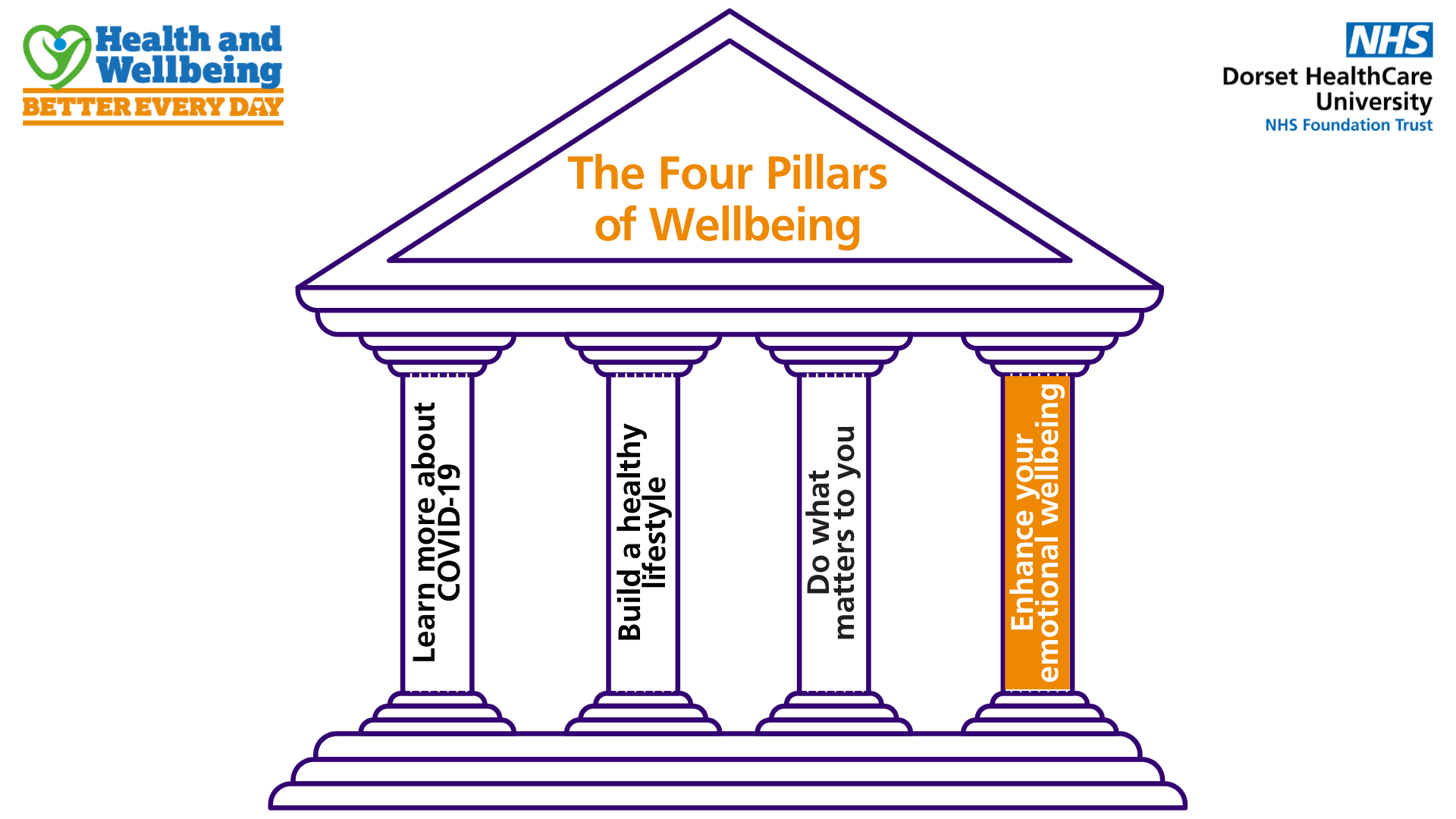Enhance your emotional wellbeing

New Ways November
"Just try new things. Don't be afraid, step out of your comfort zone and soar" - Michelle Obama
Welcome to New Ways November - find news ways of moving forward.
Learning something new or getting involved in an activity that really absorbs and interests us is great for our wellbeing. Keeping our brains active is not only good for us physically but it can help you feel you are flourishing as you see yourself make progress with a new skill, or just make you smile as you make a mess and decide to start again. :)
Being playful and trying new things is important, as is remembering that it's OK not to get it right first time - change "I can't do it", into "I can't do it...yet!"
Take back control of your life
 The outbreak of COVID-19 is stressful for many of us and feelings of fear and anxiety can be overwhelming.
The outbreak of COVID-19 is stressful for many of us and feelings of fear and anxiety can be overwhelming.
To help deal with the stress try to let go of those things over which you have no control and instead focus on the things you CAN control
Evidence also suggests there are 5 steps you can take to improve your mental health and wellbeing, which will help you feel more positive.
Obviously some of the suggestions need to be adapted to the current situation, but you'll find lots of ideas on how to accomplish this within our health and wellbeing pages.
Psychology Tools has produced the guide,Living with worry and anxiety amidst global uncertainty, to help people manage their worry and anxiety. Acknowledging that it's natural to struggle at times like these, it encourages us to remember to offer care and compassion to ourselves and those around us. The guide contains a number of practical exercises you can work through to help you deal with the feelings you may be experiencing.
Local support to help you cope with COVID
Dorset HealthCare's Steps2Wellbeing service have produced the booklet Coping with COVID - staying strong & hopeful within challenging times.
The guide contains a collection of tools and techniques to help you cope with the challenges we're all facinig at the moment, with resilience and hope. Here's a breathing technique you might like to try too.
Below are links to a series of excellent webinars our Steps2Wellbeing service have produced In collaboration with the Dorset Recovery Centre, bringing together their lived experience and joint expertise. We hope these will help you feel less isolated and more connected.
Practical things you can do to help your wellbeing
You may be worried about COVID-19 and how it could affect your life. This may include having to stay at home and avoid other people, which may feel difficult or stressful.
Mind offers some practical advice for staying at home, including a checklist, taking care of your mental health and wellbeing support for work, benefits and housing.
 FACE COVID - How to respond effectively to the Coronavirus
FACE COVID - How to respond effectively to the Coronavirus
In this brief animation, Dr Russ Harris, author of the international best-seller The Happiness Trap, illustrates how to use ACT (Acceptance and Commitment Therapy) to deal with the Corona crisis and the fear, anxiety and worry that goes with it. You can also download the accompanying e-book.
Understand how the current situation makes you think and feel
“Right now we are all going through an incredibly stressful and unique situation, one that we have never had to face before. Things may feel uncertain, unpredictable and like we have little control over them. It is understandable that this brings with it a roller coaster of mixed emotions, as well as many new challenges and concerns. We may be feeling scared, worrying a lot more than usual, feeling stressed, low or anxious. We may also feel more irritable than usual or angry. We may experience a number of these different emotions in one day, even within one hour. You may feel fine one moment and overwhelemed the next. Emotions like these are all normal and to be expected. Emotions are there to help us to respond to and face the situations in our lives. It is important to be compassionate to ourselves and those around us about how we are all feeling” (The CBT Resource: Managing Stress and Worry during the COVID-19 Outbreak)
In "The Happiness Lab" podcast, Yale professor Dr Laurie Santos takes you through the latest scientific research and share some surprising and inspiring stories that will forever alter the way you think about happiness.

Listen to Dr. Santos' special episodes on how to maintain wellbeing in the midst of the coronavirus pandemic:
- Beat your isolation loneliness
- Coach yourself through a crisis
- Rising to a challenge
- Calm can be contagious
Manage anxiety flare-ups effectively
See also our Practise relaxation, meditation and mindfulness section for more suggestions
 Doing What Matters in Times of Stress: An Illustrated Guide
Doing What Matters in Times of Stress: An Illustrated Guide
This stress management guide, produced by the World Health Organisation, has five sectinos, each containing a new idea and technique.
A few minuteseach day are enough to practice the self-help techniques, which are easy to learn and can help you reduce stress.
There are links in the guide to optional accommpanying audio exercises.
Spotted by a mental health team manager ...
Written by Imogen Wall
Ladies and Gents, this is Pandemic Anxiety 101.
IN CRISES, WE START DOING WEIRD STUFF
Over the last week I have struggled to sleep, stayed up late into the night reading endless news articles, bought pasta I don't even like very much, got angry with my mum for not staying home. My spelling is a disaster and I'm definitely drinking more. I've been a bit teary, and all I really want to eat is cake, cake and more cake. From what I got back from my post yesterday, I'm not alone.
If you're having a wobble, you may also have noticed all sorts of weird stuff going on. Are you arguing more, talking faster, struggling to sleep, restless, desperate for information? Or are you teary and overwhelmed, perhaps feeling a bit sick? Struggling to make decisions? Just want to stay in bed? Tummy upsets? Having palpitations, butterflies, headaches? Ranting, picking fights or getting into arguments? Laughing unexpectedly or saying random, inappropriate things? Developing Very Strong Opinions on epidemiology overnight? Or have you just completely gone to ground?
If you are feeling any of these things: good news! You are not going mad. And you are 100% not alone. You are, in fact, completely normal: a fully emotionally functional human being.Congratulations! Why? I'll explain: take a seat and put the kettle on ...
Managing stress and worry during the COVID-19 outbreak
Download a useful pdf on managing stress and worry during the COVID-19 outbreak from The CBT Resource.
The CBT Resource was founded to provide high quality training and resources for CBT and IAPT services to use, as well as mental health and resilience training, resources and content for digital health platforms and organisations and companies wanting to support the wellbeing of their employees.
Every Mind Matters
For practical tips and support on maintaining your mental wellbeing while staying at home and support if you're anxious or worried about Coronavirus.
Public Health England
Offers specific guidance around mental heath and wellbeingaspects of COVID-19, including managing panic and anxiety, information for older people and those living with dementia and dealing with a mental health crisis or emergency. Thee's also an easy-read guide to looking after your feelings and body.
Mental Health Foundation
Contains tips to help you, your friends and family look after your mental health at a time when there is much discussio of potential threats to our physical health. Includes advice on looking after your relationships, finance and housing worries, talking to children, random acts of kindness, coping with abusive relationships and much more.
Student Minds
Our many students and apprentices within the Trust may find the Student Minds helpful, written for people in the university community.
Samaritans
The Samaritans have taken the difficult decision to stop offering face to face support in their branches for the time being and acknowledge that it may take longer for them to answer the phone or answer emails at the moment, they are still contactable and have gathered some resources to help support people's wellbeing during the COVID-19 crisis.
Mental health tips in other languages
To help those with mental health issues such as depression, stress and anxiety, who may not speak English, below are a number of translations of the new Now more than ever mental health 10 top tips.
More information and English version available at https://www.nhs.uk/oneyou/every-mind-matters/coronavirus-covid-19-anxiety-tips/


 Mental health and wellbeing advice
Mental health and wellbeing advice
